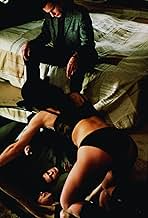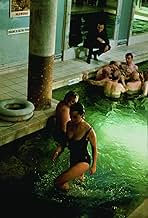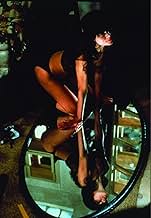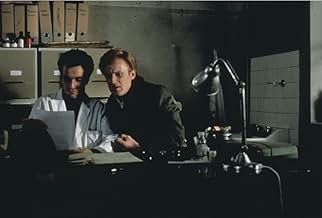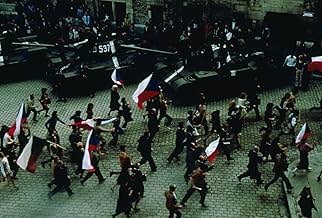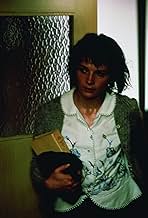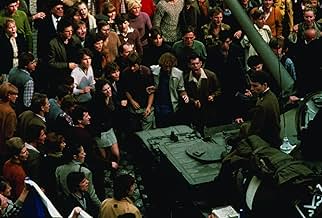L'insoutenable légèreté de l'être
Titre original : The Unbearable Lightness of Being
- 1988
- Tous publics
- 2h 51min
En 1968, un médecin tchèque dont la vie sexuelle est active rencontre une femme qui souhaite la monogamie. L'invasion soviétique va encore plus chambouler leur vie.En 1968, un médecin tchèque dont la vie sexuelle est active rencontre une femme qui souhaite la monogamie. L'invasion soviétique va encore plus chambouler leur vie.En 1968, un médecin tchèque dont la vie sexuelle est active rencontre une femme qui souhaite la monogamie. L'invasion soviétique va encore plus chambouler leur vie.
- Réalisation
- Scénario
- Casting principal
- Nommé pour 2 Oscars
- 7 victoires et 14 nominations au total
Pavel Landovský
- Pavel
- (as Pavel Landovsky)
Stellan Skarsgård
- The Engineer
- (as Stellan Skarsgard)
Tomasz Borkowy
- Jiri
- (as Tomek Bork)
Pavel Slabý
- Pavel's Nephew
- (as Pavel Slaby)
László Szabó
- Russian Interrogator
- (as Laszlo Szabo)
Avis à la une
I've not read the book this is based on, so have no way to comment on how this movie translates it. But the film itself has stayed in my mind like few others. Yes, it's very long, but the characters are so memorable that the length didn't bother me at all - I loved the time spent in their company. In particular, Juliette Binoche and Lena Olin are each astonishing in their own way. Olin is ferociously sensual and mesmerizing, while Binoche is superlatively sympathetic and sensitive. Two of the best female performances I can remember. By the end of the film I was totally wrapped up in these people's lives. This film is deeply erotic but in an intelligent and adult way that puts most other film's treatment of sex to shame. I thought it was beautifully handled by all concerned, and if I ever want to cry, I only need watch the scenes with the dog and the final scenes, both pulled off superbly.
The Unbearable Lightness of Being (1988)
I liked this book a lot, and I like director Philip Kaufman's approach to movies. The best of this movie is terrific, as well: the wild culture of personal and cultural freedom at the start, the chilling invasion of Soviet tanks in the center, and the last half hour of idealized romance and happiness in the country.
That kind of gives away the movie, it would seem. But in a way, the movie is about how all these things happen. This is where it gets to be about taste and patience. It's a long movie, and much of the events are not really a development of plot, but a steady continuation of a variety of relationships (mainly between the lead man and the two main women). There is a plot behind all this, especially around their leaving Czechoslovakia and then finding a return to bliss in the Czech countryside, but this doesn't drive the movie overall.
For me, it wasn't enough to see these people enjoying sex and discovering conflicts between the three legs of the love triangle. Scenes were often leisurely in a way that implies we were glad to just be there and watch things happen within a pocket of frozen time, rather than through time. By that I mean, it wasn't where you were going with the emotional aspects, but it was where you were, the now of the interactions. The might actually be where the book was so successful--it created moods and scenes where you were, actually, glad to just be absorbed. For me, that wasn't always the case in the film version.
Part of the problem might just be Daniel Day Lewis, who is a bit too self-satisfied, not as a character (that is certain) but as an actor. He lacks the magnetism that might sustain the unlikely and ongoing love the two women have for him, even as they know about each other. On the other hand, it's a huge, epic tale about true freedom, and a very real pursuit of happiness. And when the energy gets going, and the mood is fully expanded, there is magic. Especially, again, at the end, including the famous fade to white in the last frames, it is about a kind of heaven on earth. Who can object to that?
I liked this book a lot, and I like director Philip Kaufman's approach to movies. The best of this movie is terrific, as well: the wild culture of personal and cultural freedom at the start, the chilling invasion of Soviet tanks in the center, and the last half hour of idealized romance and happiness in the country.
That kind of gives away the movie, it would seem. But in a way, the movie is about how all these things happen. This is where it gets to be about taste and patience. It's a long movie, and much of the events are not really a development of plot, but a steady continuation of a variety of relationships (mainly between the lead man and the two main women). There is a plot behind all this, especially around their leaving Czechoslovakia and then finding a return to bliss in the Czech countryside, but this doesn't drive the movie overall.
For me, it wasn't enough to see these people enjoying sex and discovering conflicts between the three legs of the love triangle. Scenes were often leisurely in a way that implies we were glad to just be there and watch things happen within a pocket of frozen time, rather than through time. By that I mean, it wasn't where you were going with the emotional aspects, but it was where you were, the now of the interactions. The might actually be where the book was so successful--it created moods and scenes where you were, actually, glad to just be absorbed. For me, that wasn't always the case in the film version.
Part of the problem might just be Daniel Day Lewis, who is a bit too self-satisfied, not as a character (that is certain) but as an actor. He lacks the magnetism that might sustain the unlikely and ongoing love the two women have for him, even as they know about each other. On the other hand, it's a huge, epic tale about true freedom, and a very real pursuit of happiness. And when the energy gets going, and the mood is fully expanded, there is magic. Especially, again, at the end, including the famous fade to white in the last frames, it is about a kind of heaven on earth. Who can object to that?
Although the screenplay is based on the great and world-famous book by Milan Kundera, it was written by others (Jean-Claude Carrière and the director Philip Kaufman) and thus lost its original touch and approach - as was pointed out by Kundera himself who withdrew from the outcome. On the other hand, fragile feelings, ponderings and internal doubts are very difficult to express on the screen - without losing the pace and uniformity of the plot. It is also pity that Prague was not / could not been used, as it is a beautiful city and gives more realism than the French places used. Depicion of the socialist/communist oppression is, however, rather perfunctory, seeming not so serious as it really was in the 1970ies within the Warsaw block when hopes of intellectuals for the so-called human-faced socialism vanished as liberal steps were diminished or repealed.
The cast is, of course, brilliant, in particular the bohemian ménage à trois members: Daniel Day-Lewis as Tomas, Juliette Binoche as Tereza and Lena Olin as Sabina - all later multiple Academy Award winners and/or nominees, and from different European countries (the movie itself is still the US one). They and some other fine European actors have provided the movie a real European atmosphere, without a Hollywood studio feeling as sometimes perceived in "older" movies.
Nevertheless, The Unbearable Lightness of Being is still a movie high above average, enhancing historical facts as well. But it is hard to say whether is is recommendable to read the book before or after...
The cast is, of course, brilliant, in particular the bohemian ménage à trois members: Daniel Day-Lewis as Tomas, Juliette Binoche as Tereza and Lena Olin as Sabina - all later multiple Academy Award winners and/or nominees, and from different European countries (the movie itself is still the US one). They and some other fine European actors have provided the movie a real European atmosphere, without a Hollywood studio feeling as sometimes perceived in "older" movies.
Nevertheless, The Unbearable Lightness of Being is still a movie high above average, enhancing historical facts as well. But it is hard to say whether is is recommendable to read the book before or after...
The best thing about the novel was that the events were more meaningful because along with each event came a piece of the author's philosophy which made not only the plot seem whole but the author's main philosophical argument materialize more and more as we read on.
The movie was only a documentation of the plot and because it was a movie I guess it could only "lightly" touch upon the author's philosophy. Maybe a narrator in the background could have filled us in? I watched the movie not because I enjoyed the plot but because I enjoyed reading the author's ideas about life. They weren't as evident in the movie, but I gave a 6 because the acting and cinematography were good.
The movie was only a documentation of the plot and because it was a movie I guess it could only "lightly" touch upon the author's philosophy. Maybe a narrator in the background could have filled us in? I watched the movie not because I enjoyed the plot but because I enjoyed reading the author's ideas about life. They weren't as evident in the movie, but I gave a 6 because the acting and cinematography were good.
Imagine you're at the theater attending a live performance, a truly living performance in which both axioms and mythological truths are entered into and shared by actors and audience alike. Now suppose that the backdrop for all the action is dark, oppressive, and heavy, while all that transpires before it is light, glib, and ineffectual. Now consider that, through the course of the play, all that is bouncy and trivial becomes overwhelmed and absorbed by the gravity of the background, like light being sucked into the gravity of a black hole, so that what was once meaningless and unimportant and even silly becomes increasingly momentous and important and valuable as the play progresses. If you can see this outline in your mind's eye, you have a good idea about The Unbearable Lightness of Being, Milan Kundera's novel by the same name brought to life as a movie. The film, like the novel, declares one thing: `only necessity is heavy, and only what is heavy has value.' I so love this idea, this earth shattering insight: it effortlessly capsizes our Postmodern zeitgeist in one innocuous little phrase. And the film expresses it beautifully.
Set in the Prague Spring of 1968, when the Soviets put down Dubcek's `Socialism with a Human Face,' the weight of these events draws the lives of a Czech doctor, his wife, and his lovers, into its orbit. And instead of crushing them, as one might assume, it becomes the fire that purifies gold. Tomas (Daniel Day-Lewis), for example, had previously written a treatise on Oedipus, a witty exercise in sophistry aimed at the Communist regime as a provocative analogy, nothing more. But as the essay becomes an object of obsession to the Communists, we see Kundera's definition of vertigo come into play. It is not the fear of falling, but the soul's defense against the desire to fall. Tomas wanted to fall. Why? Watch the movie, and find out for yourself.
Set in the Prague Spring of 1968, when the Soviets put down Dubcek's `Socialism with a Human Face,' the weight of these events draws the lives of a Czech doctor, his wife, and his lovers, into its orbit. And instead of crushing them, as one might assume, it becomes the fire that purifies gold. Tomas (Daniel Day-Lewis), for example, had previously written a treatise on Oedipus, a witty exercise in sophistry aimed at the Communist regime as a provocative analogy, nothing more. But as the essay becomes an object of obsession to the Communists, we see Kundera's definition of vertigo come into play. It is not the fear of falling, but the soul's defense against the desire to fall. Tomas wanted to fall. Why? Watch the movie, and find out for yourself.
Le saviez-vous
- AnecdotesThe first cut shown to the studio was under two hours in length and the story was confusing. Philip Kaufman was asked to add in scenes he cut. The next day they were shown the theatrically released version. It's believed Kaufman showed them a shorter and confusing version in order to get his almost three-hour final cut approved with no questions of cutting it.
- GaffesMephisto the Pig, consistently referred to as "he", is a sow, as can be seen frequently, but particularly when the group enters the inn for dancing.
Meilleurs choix
Connectez-vous pour évaluer et suivre la liste de favoris afin de recevoir des recommandations personnalisées
- How long is The Unbearable Lightness of Being?Alimenté par Alexa
Détails
- Date de sortie
- Pays d’origine
- Sites officiels
- Langues
- Aussi connu sous le nom de
- La insoportable levedad del ser
- Lieux de tournage
- Prague, République tchèque(archive footage)
- Société de production
- Voir plus de crédits d'entreprise sur IMDbPro
Box-office
- Budget
- 17 000 000 $US (estimé)
- Montant brut aux États-Unis et au Canada
- 10 006 806 $US
- Week-end de sortie aux États-Unis et au Canada
- 202 189 $US
- 7 févr. 1988
- Montant brut mondial
- 10 006 806 $US
- Durée
- 2h 51min(171 min)
- Couleur
- Mixage
- Rapport de forme
- 1.85 : 1
Contribuer à cette page
Suggérer une modification ou ajouter du contenu manquant


